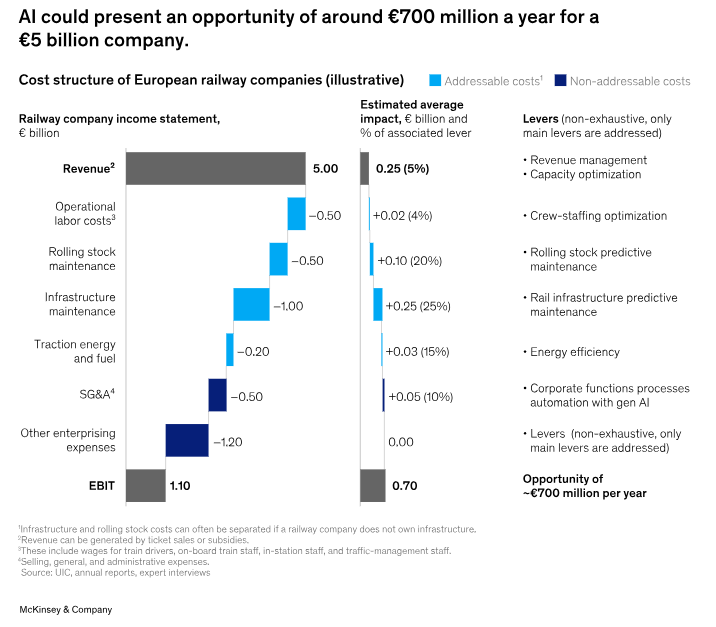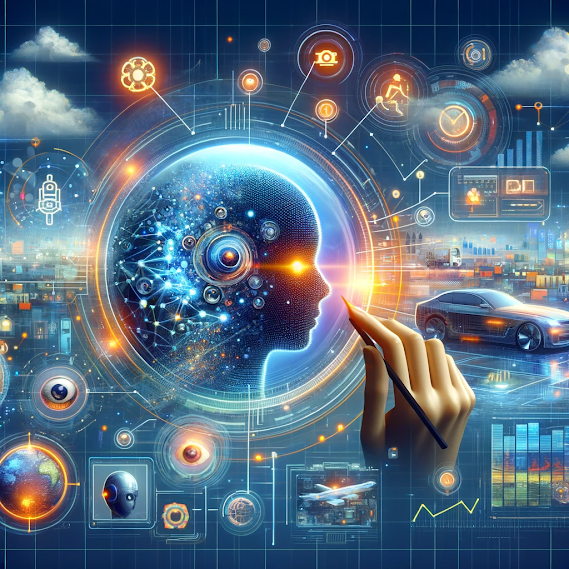Unlocking the Future of Railways with Artificial Intelligence

Unlocking the Future of Railways with Artificial Intelligence
In an era where technology is evolving at a breakneck pace, industries are constantly seeking innovative ways to enhance their operations. One sector that stands to benefit significantly from the advancements in artificial intelligence (AI) is the railway industry. With the advent
of analytical #AI and generative AI (gen AI), railway companies have a unique opportunity to revolutionize the way they plan and deliver their services.
The rise of #AI technologies, fueled by factors such as the availability of vast amounts of data and improved processing capabilities, has ushered in a new era of possibilities across various sectors. Analytical #AI enables organizations to analyze historical data and make predictions, while #genAI empowers machines to generate new content akin to human-generated output. The widespread integration of AI across industries underscores its potential to drive transformative change.
In recent years, the railway industry has grappled with challenges in adopting digital technologies, including limited data availability, regulatory constraints, and a lack of standardization. However, the emergence of analytical #AI and #genAI presents a compelling opportunity for railway companies to embrace digitization and enhance their operations.
A report titled “The journey toward AI-enabled railway companies,” produced by the International Union of Railways (UIC) in collaboration with McKinsey, sheds light on the adoption of #AI technologies in the rail sector and the potential business impact they can unlock. According to the report, railway companies have already begun implementing various #AI technologies across approximately 20 key use cases, with the potential to realize significant financial benefits.
While the adoption of AI in the railway industry is still in its nascent stages, a growing number of companies are recognizing its potential and actively exploring its applications. These applications span a wide range of business activities, including railway undertakings, infrastructure management, passenger experience, and support functions.
Railway undertakings, responsible for operating and managing railway services, have identified several mature analytical #AI use cases aimed at enhancing shift planning and energy efficiency. By optimizing crew planning and implementing predictive maintenance for rolling stock, companies have achieved notable improvements in operational efficiency and cost reduction.
Infrastructure management, encompassing the planning, operation, and maintenance of rail networks, has also seen significant advancements through #AI technologies. Predictive maintenance for rail infrastructure and real-time traffic management are among the key use cases being pursued, with the potential to improve network reliability and performance.
Passenger experience, a critical aspect of the railway industry, is being enhanced through AI-driven solutions focused on revenue management, security, and providing real-time intermodal information. By leveraging artificial vision and predictive algorithms, railway companies can improve security measures and enhance overall passenger satisfaction.
In addition to operational enhancements, #AI technologies offer immense potential to optimize support functions such as #HR, finance, and IT. While many of these use cases are still in the pilot phase, early results indicate promising outcomes in areas such as talent training and software development.
The implementation of #AI presents a significant opportunity for railway companies to unlock substantial value. By leveraging AI technologies, a €5 billion rail company could realize approximately €700 million in annual value, encompassing revenue optimization, cost reduction, and operational efficiency gains.
However, realizing this value requires a concerted effort in implementation and integration. While many use cases can be successfully deployed within 12 to 18 months, becoming a truly data-driven organization requires a fundamental shift in mindset and operating model. Railway companies must prioritize building blocks such as strategic roadmaps, talent acquisition, agile operating models, and robust data infrastructure to drive successful AI adoption.
As the railway industry continues to evolve, embracing #AI technologies will be paramount to driving innovation and meeting the evolving needs of passengers. By harnessing the power of #AI, railway companies can unlock new opportunities for efficiency, safety, and customer satisfaction, ushering in a new era of excellence in rail transportation.


.jpeg)


Comments
Post a Comment